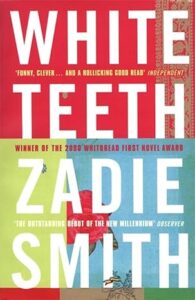Each month, we ask a member of faculty to tell us about one book that played an outsized role in making them who they are today. Charlotte Gill was in grad school when she found her Words to Live By. Twenty-five years later, the creativity and individuality she discovered in those words is something she says she sees every day in her work as the Cohort Director of the MFA Fiction program.
What book have you chosen?
White Teeth by Zadie Smith.
How and when did you come across this book?

This novel, Smith’s first, was published in 2000, the year I finished grad school. Everyone who had anything to do with writing and publishing was talking about it. It was the book that launched Smith’s career and transformed her into a literary superstar, seemingly overnight. “Seemingly” because, of course, no artistic creation like White Teeth is made without years of learning, practice and private toil.
What was it about the book that first stood out to you?
The story is a multi-family saga set in London, probably one of the most intercultural cities in the world. The narrative is layered across generations, cultures and religions in a believable, lived-in way. It’s also hilarious, somehow cheeky and genuinely empathetic at the same time. The ensemble cast is huge, resembling the barely contained chaos of a big family in a too-small house.
 How did this book shape you?
How did this book shape you?
I had read plenty of “immigrant” novels by then and had often sensed something dusty and nostalgic about the conflicts presented between those pages, but Smith’s second-gen voice was young and forward-facing, all-in on Western living. She saw (and still sees) the many juxtapositions and frictions of immigrant family life in a way that resembled my own experiences. It has its ruptures, for sure, but it’s also very funny sometimes, and comedy can be a form of reclaimed power.
What do you think it is about this book that made such an impact?
Smith wasn’t modest in her style. The New York Times critic James Wood famously hated the book for its maximalist indulgences, calling it “hysterical realism.” No one had ever read a voice like Smith. She wrote big, ambitious, erudite stories with working-class dialogue. She knew the English canon well (Forster is one of her heroes), and she reimagined those forms with Black and brown characters. She took up space. Not everyone liked it at the time, but I think she paved the way for many novelists who’ve come since. New talent can seem very different when it breaks from tradition or transmutes it, but creativity is always reinventing itself. I’m reminded of this every day in the Master of Fine Arts in Fiction program at King’s by our amazing community of faculty and students. Everyone sounds uniquely like all the places they’ve come from.
Have you reread this book? Does it resonate differently today than it did on first reading?
I read a lot of books every year, for work and pleasure, and I read them quickly. The downside is I seldom get to revisit the old ones. But they live there on my bookshelf and also in my memory.

